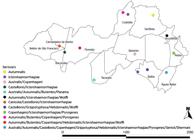ABSTRACT:
This study aimed to analyze epidemiological aspects and spatial characteristics of Lesptospira spp. infection among sheep in Pernambuco state, Brazil. A total of 426 samples were collected from unvaccinated animals aged 1 year or older, and submitted to Microscopic Agglutination Test (MAT). To study the risk factors, a standardized investigative survey of sheep farmers, with objective questions, was conducted to establish the general characteristics of the farm property production, reproductive management, and health plan. From 426 samples analyzed, 83 (19.5%; CI 15.9 - 23.6%) were positive; among them, the most prevalent serovar was Autumnalis (32.4%). Significant differences were observed between gender (OR = 0.38; CI 0.14 - 0.99), production system (OR = 2.03; CI 1.07 - 3.84), types of herd (OR = 2.28; CI 1.39 - 3.72), absence of rodents to the grain storage (OR = 0.55; CI 0.34 - 0.91), and restriction to surface waters (OR = 0.60; CI 0.37 - 0.99). Leptospira spp. infection is disseminated in sheep herds, and multiple factors can influence its occurrence. Health education programs and worker training in prevention and control of leptospirosis and other infectious diseases may be useful to reduce infection rates and economic losses caused by this disease.
KEYWORDS:
epidemiology; leptospirosis; sheep industry

 Thumbnail
Thumbnail
 Thumbnail
Thumbnail



